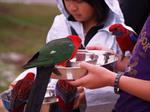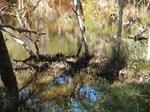COURSE CONTENT
There are 12 lessons in this module as follows:
1. Introduction to Nature Park Management – the role and scope of nature parks; the importance of indigenous vegetation in nature parks.
2. Basic Ecology – the environment, plants and animals; ecosystem concepts.
3. Soil Management in Nature Parks – soil characteristics and problems; earthworks.
4. Plant Maintenance – basic gardening techniques; natural gardening; plant selection; succession planting; equipment.
5. Design of Nature/Wilderness Parks I – collecting site information; preparing concept plans.
6. Design of Nature/Wilderness Parks II – drawing the final plan; construction estimates; designing animal enclosures.
7. Weed Management – characteristics of weeds; weed control; environmental weeds.
8. Pest and Disease Management – management strategies; chemical safety.
9. Culture of Indigenous Plants – techniques for establishing vegetation; planting design.
10. Tree Management – role of trees in nature parks; tree maintenance plans; pruning and tree surgery.
11. Turf Care – turf varieties in nature parks; lawn preparation, establishment and maintenance.
12. Rehabilitation: Problems and Solutions – aims and strategies; soil problems and solutions in degraded sites.
COURSE AIMS
 On completion of the course you should be able to do the following:
On completion of the course you should be able to do the following:
- Explain the importance of the interrelationships between various components of a natural environment within an ecosystem.
- Develop management strategies for soils within a natural ecosystem.
- Develop management strategies for plant maintenance practices, in nature parks.
- Design a nature park, or a section within a nature park.
- Develop management strategies for the control of weed problems in a nature park.
- Develop management strategies for the rehabilitation of degraded sites in a nature park.
WHAT YOU WILL DO IN THIS COURSE
Here are just some of the things you may be doing:
 Differentiate between different categories or types of nature parks.
Differentiate between different categories or types of nature parks.- Determine thirty living components of a specific ecosystem, studied by you.
- Determine ten non-living components of a specific ecosystem, studied by you.
- Prepare a labelled diagram to illustrate the interrelationships between at least fifteen different components of an ecosystem.
- Explain the possible impact of removing two different specified organisms from a specified ecosystem.
- Explain the potential impact of adding non indigenous organisms, to a specified ecosystem.
- Explain how different soil characteristics can impact upon an ecosystem.
- Describe the physical characteristics of at least three different soils, which are of significant to the stability of their ecosystems.
- Assess aspects of soil dynamics on a site, including: -Topography -Soil life
- Susceptibility to degradation -Sunlight (canopy penetration).
- Compare the likely implications of using three different types of fertilisers, including: - Benefit to plants - Method of use - Environmental impact.
- Explain the use of different soil conditioners including: -pH modifiers -Ameliorants - Organic matter.
- Determine the plant maintenance requirements of a specific nature park visited and assessed by you.
- Develop guidelines for the care of new plantations in a nature park visited by you.
- Compare the suitability of three different types of grass cutting equipment, for mowing a specific park.
- Compare the likely environmental impact of different types of pesticides used on a specific site.
- Determine the significance to plant populations, of containment of different outputs, on a specified site, including: -water run-off -chemical spray drift -effluent -pollutants.
- Prepare a plant collection of sixty plants.
- Determine categories of landscape developments which are carried out in different types of nature parks, including: -Wildlife Reserves -Zoos -Sanctuaries -National Parks -Forest Reserves -Vegetation corridors.
- Evaluate the designs of two different sections, of different nature parks, against given criteria.
- Collect pre-planning information for the development of a site, within a nature park.
- Prepare two concept plans for a nature park development, including:
-existing features -clear labelling -legend -scale -north indicator.
- Compare features of two nature park concept plans.
- Plan the construction of a landscape development within a nature park, including: -materials lists (types and quantities of materials); -plan of proposed landscape development; -list of manpower and equipment requirements; -a work schedule.
- Estimate the cost of construction in accordance with a specified landscape plan.
- Estimate the cost of maintaining a specified section of a park, for a three month period.
- Explain the impact of weeds on two natural environments in the learners locality, using examples.
- Prepare a weed collection, of twenty different weeds.
- Describe two different weed problems, in two different nature parks.
- Explain five different weed seed dispersal mechanisms, for weed species collected.
- Compare alternative control methods for a specified weed problem.
- Select appropriate control methods for ten different specified weed problems.
- Develop guidelines for weed control, in a nature park inspected by you.
- Develop a management plan to reinstate indigenous flora on a specific site.
- Explain the causes of three specified types of site degradation.
- Describe five different techniques for controlling site degradation.
- Describe five different techniques for repairing site degradation.
- Describe degraded sites at two different natural areas, you inspect.
- Prepare construction details for work to be undertaken in the rehabilitation of a degraded site you inspect.
- Develop a management plan for a degraded site, in a natural area you visit.
What This Course Could Do For You
This course helps students to develop designs for nature park development and to work out strategies for the preservation and public use of these spaces. You'll also learn how maintain and improve existing parks and their features.
This Course is Suitable For
This course is aimed at those working in or aspiring to work in the following fields:
- Ecotourism
- Conservation
- Parks & Gardens
- Land Management
WHY CHOOSE US?
-
Reputation: well-known and respected in horticulture.
-
Industry focus: courses designed to suit industry needs and expectations.
-
Different focus: develop problem solving skills that make you stand out from others.
-
Hands-on: develop practical as well as theoretical skills.
-
Lots of help: dedicated and knowledgeable tutors (faculty of internationally renowned horticulturists).
-
Efficient: prompt responses to your questions.
-
A long track record: established in 1979 with a solid history.
-
Up to date: courses under constant review.
-
Resources: huge wealth of constantly developing intellectual property.
-
Value: courses compare very favourably on a cost per study hour basis.
-
Student amenities: online student room, bookshop, ebooks, acs garden online resources.
Enrol Today or Find Out More
You can start at any time - it's easy to enrol, just go to the panel at the top right of this page.
Or, if you have any questions or want to find out more about studying with ACS, get in touch today on (UK) 01384 442752 or (International) +44 (0) 1384 442752, or
submit questions to our specialist Horticulture tutors - they will be pleased to hear from you.